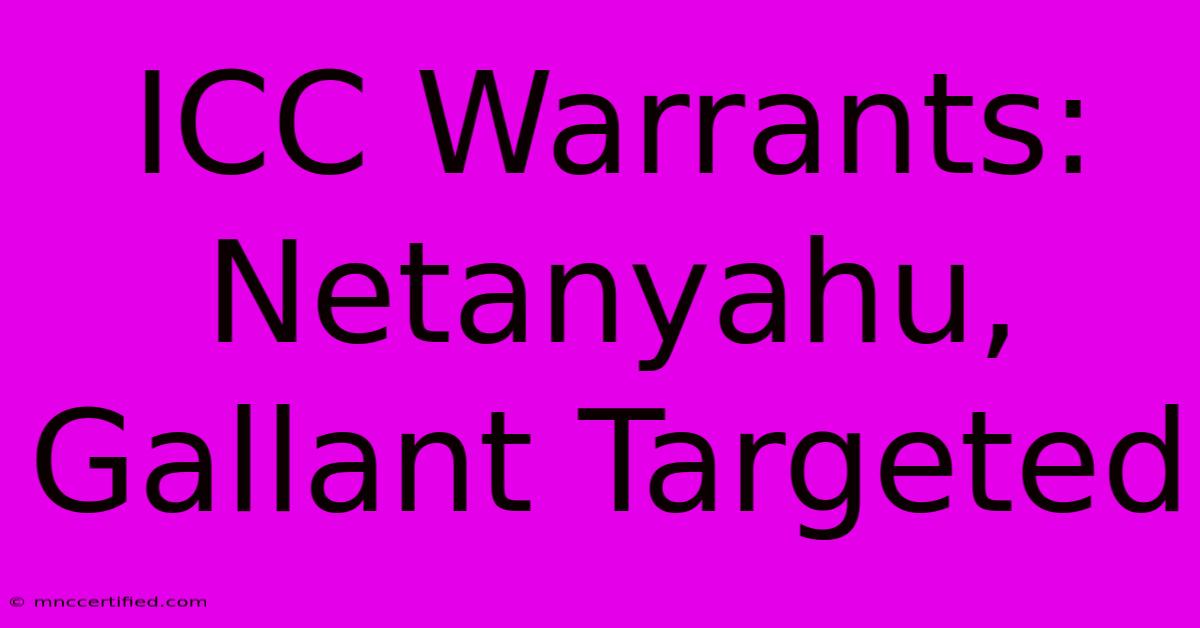ICC Warrants: Netanyahu, Gallant Targeted

Table of Contents
ICC Warrants: Netanyahu, Gallant Targeted – A Deep Dive into the Implications
The International Criminal Court (ICC) issuing arrest warrants for Israeli Prime Minister Benjamin Netanyahu and Defense Minister Yoav Gallant has sent shockwaves through international relations. This unprecedented move demands a thorough understanding of its implications for the Israeli-Palestinian conflict, international law, and global politics. This article will delve into the details of the warrants, analyze their legal basis, and explore the potential consequences.
Understanding the ICC's Jurisdiction and the Warrants
The ICC's jurisdiction is based on the Rome Statute, an international treaty establishing the Court. Israel, however, is not a signatory to the Rome Statute. This raises the crucial question: how can the ICC claim jurisdiction over Israeli officials?
The ICC's assertion of jurisdiction rests on the principle of universal jurisdiction and its mandate to investigate alleged war crimes committed within the Palestinian territories, which the Court considers occupied territory. The warrants specifically allege responsibility for the situation in the occupied Palestinian territories, including the establishment of settlements and the transfer of Israeli civilians to occupied territories. The ICC argues these actions constitute war crimes under the Rome Statute.
Charges Against Netanyahu and Gallant:
While the exact details remain somewhat opaque, the warrants likely focus on:
- Alleged war crimes related to the expansion of Israeli settlements: The ICC views settlement construction as a violation of international humanitarian law.
- Alleged war crimes related to the transfer of Israeli civilians to occupied territories: This directly relates to the ongoing settlement expansion and the displacement of Palestinians.
- Potential charges related to the conduct of Israeli forces in the occupied territories: This is a broad area encompassing numerous potential accusations, depending on the specific evidence gathered by the ICC.
The Legal and Political Ramifications
The issuance of these warrants has immediate and far-reaching consequences:
- International Condemnation and Support: The warrants have sparked strong reactions, with Israel vehemently rejecting the ICC's authority and allies expressing concerns about the Court's actions. Conversely, Palestinian authorities and many human rights organizations have welcomed the warrants as a step towards accountability.
- Impact on the Israeli-Palestinian Peace Process: The warrants likely hinder any progress towards a lasting peace agreement, exacerbating existing tensions and mistrust. The legal battles surrounding the warrants will further complicate already fragile negotiations.
- Challenge to International Law: Israel’s refusal to recognize the ICC's jurisdiction challenges the very foundation of international law and the principles of accountability for war crimes. This sets a precedent with significant implications for the global legal order.
- Implications for Global Diplomacy: The warrants introduce a significant rift between Israel and its allies, potentially straining international relations and diplomatic efforts.
Potential Future Scenarios and Unanswered Questions
The situation remains fluid, with several key questions unanswered:
- Will Israel cooperate with the ICC? The Israeli government has explicitly refused to cooperate, making enforcement extremely challenging. The practicality of arresting and prosecuting Netanyahu and Gallant remains highly questionable.
- What role will other nations play? The actions of countries that are both allies of Israel and signatories to the Rome Statute will be crucial in shaping the ICC's ability to proceed.
- How will this impact future investigations? The ICC's actions will undoubtedly embolden further investigations into alleged Israeli human rights violations, setting a precedent for future accountability efforts.
Conclusion: A Turning Point in International Law?
The ICC warrants for Netanyahu and Gallant represent a significant escalation in the Israeli-Palestinian conflict and a pivotal moment in international law. The long-term consequences are unpredictable, but the warrants underscore the growing tension between national sovereignty and international justice. The ongoing legal battles and political ramifications will continue to shape the geopolitical landscape for years to come. This situation demands continued monitoring and analysis as events unfold. The debate surrounding the ICC's jurisdiction and the legality of Israeli actions in the occupied territories promises to remain a central point of contention in international relations.

Thank you for visiting our website wich cover about ICC Warrants: Netanyahu, Gallant Targeted. We hope the information provided has been useful to you. Feel free to contact us if you have any questions or need further assistance. See you next time and dont miss to bookmark.
Featured Posts
-
Dubai Jail Threat Uk Backing Britons Case
Nov 22, 2024
-
Great Florida Insurance Palm Bay
Nov 22, 2024
-
My Oura Ring Experience Honest Review
Nov 22, 2024
-
Palace Coral Gables Uk Documentary Feature
Nov 22, 2024
-
Brightway Insurance Charlotte Nc
Nov 22, 2024